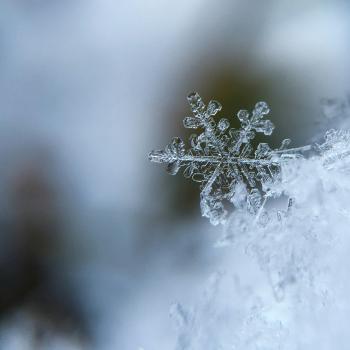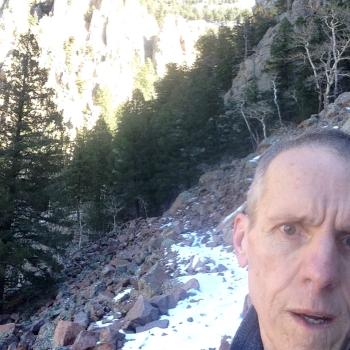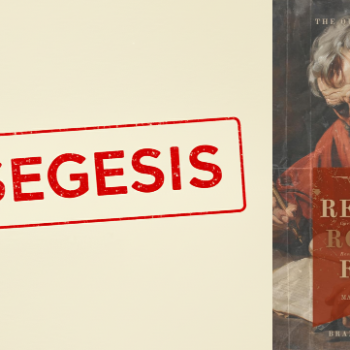Editors' Note: This article is part of the Patheos Public Square on Best Practices for Peace in 2015. Read other perspectives here.
It's Christmas Day as I write, the day I learn of the death of my peacemaking hero Rabbi Leonard Beerman. He died yesterday at age 93, and his obituary in the Los Angeles Times this morning named him as "the pacifist rabbi." Indeed he was that and it cost him a lot. And he taught me a lot.
He gave me my first lesson in the essential practice of peace. We worked together for peace back in the early 1980s, when I was working for an interfaith nuclear disarmament organization. We shared a biblical imperative for peace from both of our traditions, from the psalmist's call to "seek peace and pursue it" to Jesus' echoing Isaiah with "blessed are the peacemakers." We also shared a political and historical view about the folly of the nuclear arms race. But it wasn't scripture or policy that taught me the practice of peace. It was the rabbi himself, with his gracious and generous regard for the other.
I've told the story before about the rabbi's lesson, and that story is fresh with me today as I celebrate his life and his peacemaking, and try to imagine the practices that could make for peace in this violent world of ours. (See my book Claiming the Beatitudes, pp. 99-100 and Sojourners, December 2013, p. 20.)
I went to see the rabbi one day in 1982, on a day when I was just about ready to give up. I was feeling that it was futile to protest the arms race when every day the weapons budgets swelled bigger, the nuclear stockpiles rose higher, and our country sold more and more weapons to more and more Third World countries. The spiral of violence seemed out of control, just as it does today.
"Our efforts are so puny. Nobody listens. It's hopeless. Why do we bother to keep working for change?" I asked.
Rabbi Beerman listened, as he always listened to my questions and complaints. Without a word, he reached into his desk drawer and pulled out a picture of his new grandson, Matthew Benjamin. He asked to see a picture of my new baby son, Benjamin Michael.
In the style of all wisdom teachers, he asked me a question. He invited me to think about these two little boys and the world in which they would grow up. He asked me to think about what we owed them. And then he asked: "If we cannot cultivate a passion for what one human being owes to another, what are we?"
I can hear the echo of his question from that day to this, from that 1980s arms buildup to "shock and awe" over Baghdad to unending war in the Middle East to Columbine, Tucson, Trayvon, Newtown, Chicago, Boston, Ferguson, Brooklyn, and all the other places of violence that cry out for peace. The rabbi's question, "If we cannot cultivate a passion for what one human being owes to another, what are we?" is nothing more and nothing less than a call to recognize our common humanity, to extend regard to the other, to recognize, as Parker Palmer puts it in Healing the Heart of Democracy, that "we are all in this together," and we owe one another our best effort at building community.
To recognize that "we are in this together" is a practice of peacemaking, and one way to "cultivate a passion for what one human being owes to another." I've been signing my emails with the phrase "we're all in this together" since I heard Parker Palmer use it in a workshop in early 2010. He names it as the first of five interrelated "habits of the heart" that can sustain a democracy. (The other four build upon this first one: develop an appreciation of the value of "otherness"; cultivate the ability to hold tension in life-giving ways; generate a sense of personal voice and agency; strengthen our capacity to create community.)
So I write "we're all in this together" as sort of a string-around-my-finger reminder to give my best effort toward the building of human community. It's only a signature, but it echoes for me the rabbi's call for regard of the other, as it names our human interdependence across tribe and race and gender and every kind of difference.
It's a stance of humility and of audacity at the same time: we are accountable to one another, dependent upon one another, and only when we see this can we dare to build the kind of community that fosters the common good for the sake of Matthew Benjamin and Benjamin Michael and all the children of our cities and towns and war zones and refugee camps. Otherwise, I fear, we all retreat to our private bunkers and our personal choices. We all know that the choices we make in the grocery store have an impact that reaches far beyond our shopping cart or our kitchen table. We love our cars and our electronic devices and our latest upgrades, and we all know, don't we, that they link us into the geopolitics of a warring and warming planet. In the face of our American culture of competition, consumerism, hyper-individualism, and super-personalization, to say that "we're all in this together" is, well, counter-cultural. Maybe, hopefully, it's a revolutionary act.
1/7/2015 5:00:00 AM




